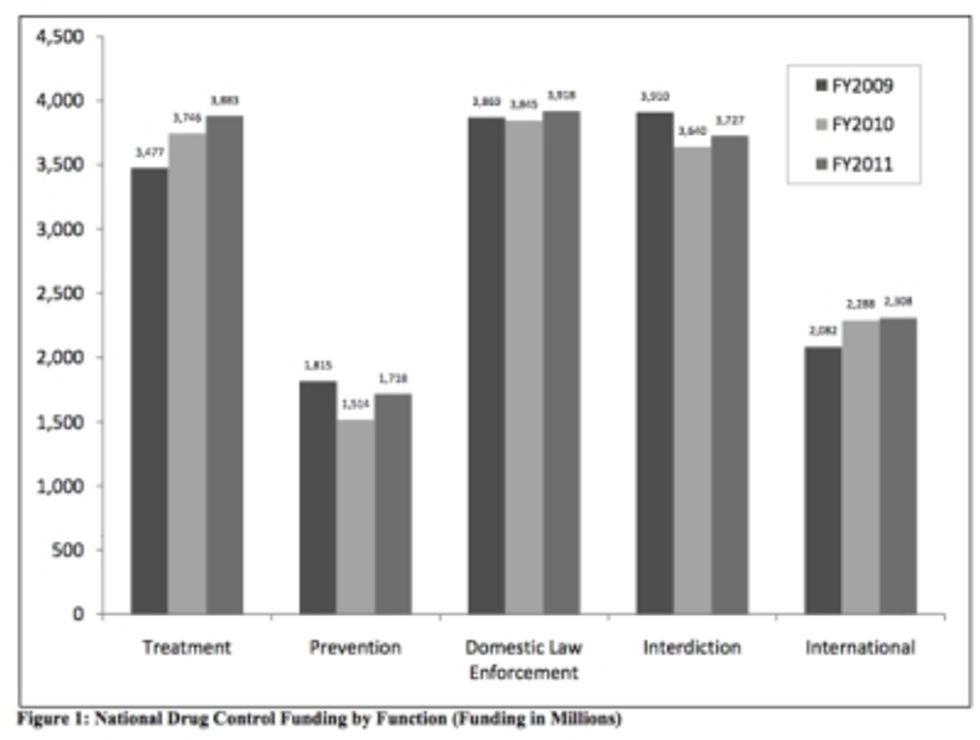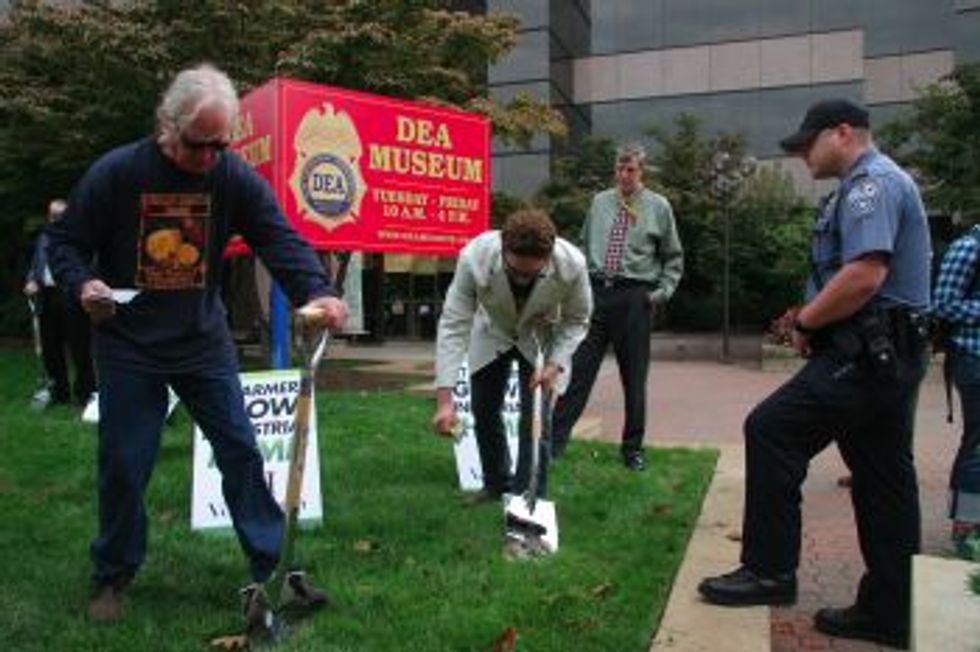Federal Appeals Court Just Says No to Florida Welfare Drug Test Law
Florida Governor Rick Scott's (R) drug testing crusade hit yet another roadblock Wednesday as a federal appeals court upheld a lower court's ruling that his plan to make welfare applicants submit to mandatory, suspicionless drug tests was unconstitutional.
As other Republican governors—most notably Scott Walker in Wisconsin and Paul LePage in Maine—did in this year's election campaign, Rick Scott made drug testing a key campaign promise in his 2010 election campaign. The following year, the Republican-dominated state legislature acceded to Scott's request and passed a welfare drug testing law.
Welfare applicants weren't the only target of Scott's drug testing push. He also sought to impose random, suspicionless drug testing on state employees through an executive order. But that was struck down by the federal courts as violating the Fourth Amendment's proscription against unreasonable searches and seizures. The US Supreme Court denied his appeal of that ruling in August.
And now, the second prong of Scott's drug testing thrust has been struck down. The decision came in Lebron v. Florida Department of Children and Families, in which Navy veteran, college student, and single father Luis Lebron filed for food stamp assistance, but was denied after he refused to undergo a drug test. Supported by the ACLU of Florida and the Florida Justice Institute, Lebron sued to have the law overturned.
Citing a lengthy history of federal court precedents, Lebron's legal team argued that like the random, suspicionless drug testing of state workers, the mandatory, suspicionless drug testing of welfare applicants violated the Constitution's protections against unreasonable searches and seizures. US District Court Judge Mary Scriven agreed, ruling in 2011 that the policy was unconstitutional.
The never-say-die Scott appealed that decision. The 11th Circuit Court of Appeals in Atlanta held a hearing on the case on November 20. It then took less than two weeks to reach its decision.
The bipartisan panel of federal judges ruled unanimously that the state of Florida had failed to provide any evidence that there was a strong government need to strip welfare applicants of constitutional protections.
"We have no reason to think impoverished individuals are necessarily and inherently prone to drug use, or, for that matter, are more prone to drug use than the general population," Judge Stanley Marcus wrote for the court. "The State has presented no evidence demonstrating that drug testing saves a significant portion of TANF funds that could otherwise be spent on drugs," he added, pointing to a 2000 state study that found welfare applicants were less likely to use drugs than the general population and noting that in the three months the drug testing program was in effect, only 2.76% of applicants tested positive.
"In the final analysis, the warrantless, suspicionless urinalysis drug testing of every Florida TANF applicant as a mandatory requirement for receiving Temporary Cash Assistance offends the Fourth Amendment. On this record, the State has not demonstrated a substantial special need to carry out the suspicionless search -- we see no concrete danger, only generalized public interests," Marcus wrote.
Marcus also noted that "citizens do not abandon all hope of privacy by applying for government assistance" and that "by virtue of poverty, TANF applicants are not stripped of their legitimate expectations of privacy." Having to urinate in a cup in front of another person "intrudes upon expectations of privacy that society has long recognized as reasonable," he added.
Nor were the judges buying the state's argument that welfare applicants effectively waived their constitutional rights by consenting to drug tests as a condition of receiving benefits or that the state had a "special need" to protect the children of drug-using welfare applicants.
"[T]he State cannot use consent of the kind exacted here -- where it is made a condition of receiving government benefits -- to wholly replace the special needs balancing analysis," the court held. "We respect the State’s overarching and laudable desire to promote work, protect families, and conserve resources. But, above all else, we must enforce the Constitution and the limits it places on government. If we are to give meaning to the Fourth Amendment’s prohibition on blanket government searches, we must --and we do -- hold that [the welfare drug testing law] crosses the constitutional line."
While, given a solid line of federal court setbacks for the law, the 11th Circuit's decision was not exactly a surprise, advocates pronounced themselves well-pleased.
"The 11th Circuit has affirmed that the 4th Amendment applies to everyone, even those applying for government assistance, said Florida Justice Institute executive director Randall Berg. "The same rationale for requiring suspicionless drug tests of TANF recipients could be used to require suspicionless searches for any kind of government benefit, whether it is social security, farm subsidies, or student scholarships. Today, the court has rejected that rationale, drawing a clear line that will keep us from going down that slippery slope."
"We are very pleased by the Court’s opinion, which once again makes clear that the US Constitution forbids the State of Florida from subjecting ordinary private citizens to invasive and unwarranted searches," said ACLU of Florida associate legal director Maria Kayanan.
"This is a resounding affirmation of the values that the Fourth Amendment of the U.S. Constitution protects – that none of us can be forced to submit to invasive and humiliating searches at the whim of the government, and that the Constitution protects the poor and the wealthy alike," she continued. "The Court has once again confirmed what we argued all along: that the state of Florida cannot treat an entire class of people like suspected criminals simply because they’ve asked the State for temporary assistance."
While the federal courts have been clear that, with limited exceptions, mandatory, suspicionless drug testing violates the Constitution, Republican governors and legislators in other states have responded by passing public benefits drug testing laws that can pass constitutional muster by first establishing some sort of "reasonable suspicion" before requiring drug testing. According to the National Council of State Legislatures, at least 11 states have done so.
The results have not been particularly impressive. In Kansas, only 20 people have been tested in the first four months the law has been in effect; four failed the drug test. Next door in Missouri, the state is spending $336,000 a year on its welfare drug testing. It has tested 655 people; 69 failed the drug test. But 711 others refused to take it. In Utah, a year after it passed a 2012 welfare drug testing law, the state had spent $30,000 to drug test applicants, but only came up with 12 who tested positive. In Tennessee, where a similar law went into effect this year, the state has tested 800 applicants, with only one person testing positive.
But whether public benefits drug testing programs actually either save states money by reducing welfare rolls or help families by encouraging recipients to go straight is probably not as important to politicians as the political calculus behind them. With its coded appeal to racial and class hostilities wrapped in a guise of caring and fiscal responsibility, it's a red meat issue for the Republican base.




